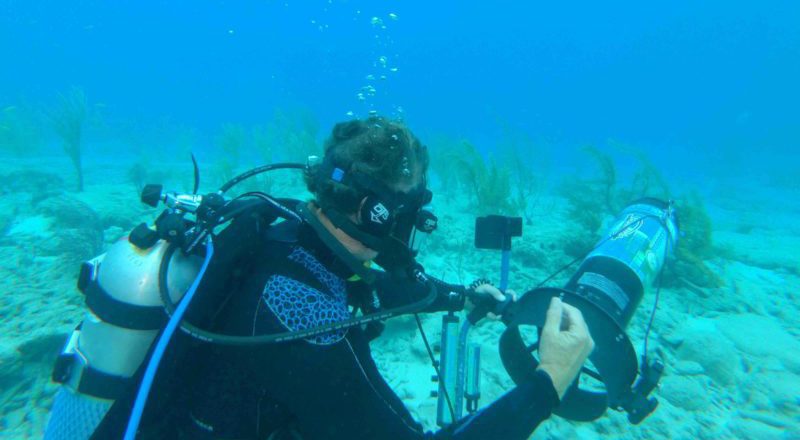INTERVIEW: The hunt is on for ‘Cooper’s Treasure’ on Discovery
Photo: Darrell Miklos is the subject of the Discovery Channel show Cooper’s Treasure. Photo courtesy of Discovery Channel / Provided with permission.
No one knows exactly how many shipwrecks lie at the bottom of the oceans of the world. Every year there are multiple headlines about new searches to find these vessels and begin the arduous task of filling in the blanks on their history and ultimate demise. One of the people at the center of the shipwreck world is Darrell Miklos, subject of Discovery Channel’s successful reality series Cooper’s Treasure, which continues with new episodes Fridays at 9 p.m.
On the show, Miklos and his team work tirelessly to find shipwrecks and their possible treasure troves. His map to find these vessels is an unusual one. The adventurer uses coordinates left by astronaut Gordon Cooper, a man who charted different anomalies in the Caribbean — all while he was orbiting space in the 1960s and 1970s.
In 1997, Miklos accompanied Cooper on a trip to the Bahamas, but returned home unsuccessful. What Miklos was able to salvage from the trip was a strong friendship with Cooper, which continued for another seven years, until the astronaut’s death. During that friendship, Miklos found out about Cooper’s map and the many discoveries waiting to be found.
“We started working on some of these expeditions that he never finished since the ’60s, and then he passed away,” Miklos said. “But before he did, he gave me the files.”
The potential discoveries in the Caribbean are almost countless, Miklos said. His adventuring could go on for more than 100 years, and he still would not be able to discover everything that’s left on the ocean floor around these islands.
“So there was about 36 of them that he put on the original chart that he got anomaly readings while he was flying in space; 99 percent of the work was done when he came back to Earth and went to investigate some of the sites,” Miklos said. “[He] got anomaly readings on a crude version of a magnetometer that he was using on the Mercury mission flights. … He knew what he was looking for because he was treasure hunting way before he ever made it to space, and so when he came back to Earth, he used the photographs to ID these other targets, along with the anomaly targets. And he investigated those sites with some treasure-hunting people out of Florida.”
The legality of navigating these treasure hunts is a constant obstacle for Miklos and his team. He needs to have constant conversations with governments in the Caribbean and respect the rules when it comes to salvage applications and leases. It’s a complicated matter that doesn’t always make life easy.
“Right now, we’re just continuing in the Bahamas, and it’s been a fantastic country to work with,” he said about his present expeditions. “But again the legalities are a nightmare. It’s all about lawyers and contractual agreements, and that’s just part of the business.”
Although treasure hunting has an inherent money factor, Miklos said what motivates him more is a sense of adventure. He doesn’t mind a good payday, but he said folks don’t get into treasure hunting — a highly risky venture — for only the monetary rewards.
“Gordon and I were pioneers I guess,” he said. “I’m an explorer, and I like the adventure. Of course, I like finding treasure. I would be lying if I said I didn’t, but that’s not the only goal I have in mind. … I wasn’t in it for the money because I could have made a lot more money doing something else — trust me. I did this because I’m passionate about it, the way Gordon was.”
For Miklos, the determination he has for this line of work has largely to do with the power of the stories he is able to unearth.
“I want to find and uncover stories that have never been told, i.e. shipwrecks that nobody has heard of before,” he said. “I could go and work and piggyback on existing leases in Florida, and work like most of the other treasure hunters as subcontractors on an existing lease, and look for treasure, and play it safe. But I took it a step further and decided to branch out into areas unknown and unsalvaged and unexplored, so I’m doing it more for the adventure and exploration. I don’t know, I just love what I do. It’s not all about treasure for me, but I can tell you that’s part of it, obviously. But it’s more about sharing the wealth of information with the host countries. … There’s so many untold stories. There’s literally millions of shipwrecks in the ocean, and nobody knows where they went or how they went down. And those lives perished for nothing. No, there’s a story to be told there. If those people were related to you, you’d want that story to be told, and that’s how I look at it.”
By John Soltes / Publisher / John@HollywoodSoapbox.com
Cooper’s Treasure continues with new episodes Fridays at 9 p.m. on Discovery. Click here for more information.


This entire story is looking more and more imaginary. There was no secret DoD sensor on board because there was neither room nor battery power to spare — nor any value over carrying it on an airplane. The cameras had a limited number of film packs, about a few dozen photographs in total were catalogued [NOT ‘5000’]. NONE were over the Caribbean.
Cooper did not have a private notebook to write stuff down in and hide from NASA — every body orifice was routinely searched after landing [grin].